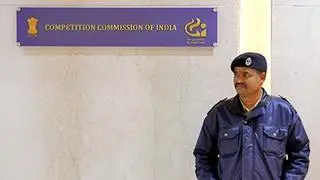Exports of iron ore from the country should not be encouraged as it is not a renewable material, the Competition Commission of India (CCI) has recommended.
India should instead consider adopting the Chinese strategy of importing iron ore even though China is one of the leading global producers of iron ore, which has helped the East Asian country become the world’s top manufacturer of steel, it suggested.
“By discouraging such (iron ore) exports, we can enhance the domestic supply. It is crucial to bear in mind that excessive consumption of iron ore today might result in its depletion, affecting the resources available to future generations,” said a new Market Study on Mining Industry released by CCI on Monday.
As country transitions to Aatmanirbhar Bharat, India should prioritise the export of higher value-added products such as finished steel, said the Study Report titled ‘Dynamics of competition in the mining sector in India with a focus on iron ore’.
In order to address the problem of the accumulation of low-grade iron ore, once iron ore exports are discouraged, India should implement the most cutting-edge technologies to upgrade low grade iron ore to higher grades through beneficiation processes, the study recommended.
The study highlighted that government has been changing the export duty structure for iron ore sector from time to time to regulate the outward movement of the ‘national wealth.’
Starting from November 19, 2022, the Centre removed the export duty imposed on low-grade iron ore, pellets, and specified steel products, including pig iron.
However, for high-grade lumps and fines containing more than 58 per cent iron, a reduced export duty of 30 per cent is applicable. “Considering that iron ore is a non-renewable national resource and a vital raw material in various industries, strict control over its over exploitation is necessary,” the CCI study said.
The Study noted that India is self-sufficient in iron ore production, and contributes 7 percent of the global production (4th largest in the world).
The value of iron ore export in recent years has been much higher than that of imports. India’s export competitiveness measured in terms of Revealed Comparative Advantage Index in iron ore has increased post 2015, especially for value added products like pellets.
OTHER RECOMMENDATIONS
To address the current bottleneck in availability of iron ore under e-auction process, the study recommended that e-auctions could be held weekly or bi-weekly, as per the business requirements of the firms.
The study also laid emphasis on promotion of sustainable mining through regulations to gradually phase out ‘dirty’ technologies over time.
A well-defined regulatory framework should encourage the adoption of clean technology and provide incentives for the transformation of existing production processes into sustainable modes of mineral production.
It also recommended that ease of implementing regulations may be ensured to reduce the high cost of compliance.
CAPTIVE MINES
The study said that allocation of captive mines to some players creates entry barriers in the iron ore and steel sector as entry and successful operation becomes costly for new firms.
The differential pricing of iron ore for different end-users is likely to create competition concerns.
The study observed that it is not possible to withdraw the already operational captive mines before completion of their tenure as this could disrupt synergies and efficient production.
It noted that the amendments in mining law in 2021 have allowed the captive mines to sell up to 50 percent of surplus iron ore in the open market which is likely to boost supply of iron ore in the market.
The study, however, emphasised that when a captive mine sells its surplus input to other entities, it is crucial to monitor the prices charged to ensure that it does not result in high costs for the buyer firm, especially if the buyer competes with captive mine owned firm in the steel market.
To compensate for those without captive mines, preferential treatment should be granted to those entities when allocating iron ore through long-term linkage by Odisha mining corporation, the study has recommended.







Comments
Comments have to be in English, and in full sentences. They cannot be abusive or personal. Please abide by our community guidelines for posting your comments.
We have migrated to a new commenting platform. If you are already a registered user of TheHindu Businessline and logged in, you may continue to engage with our articles. If you do not have an account please register and login to post comments. Users can access their older comments by logging into their accounts on Vuukle.